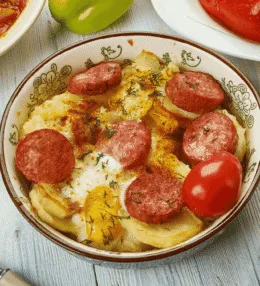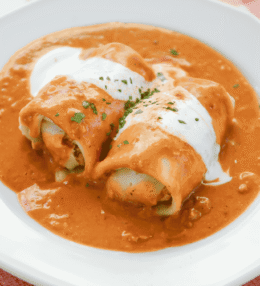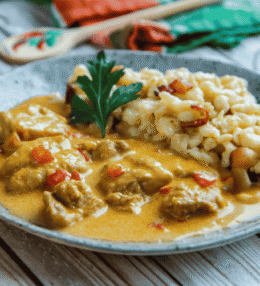
- View
Table of Contents
ToggleMontreal bagels have become a defining food of the city, offering a sweeter, denser take on the traditional bagel. They are smaller, lighter, and chewier than their New York cousins, often toasted over wood fire and enjoyed warm from the oven.
These bagels carry a sense of place in every bite. They are hand rolled, boiled in honey water, and baked until golden. The process gives them a distinctive flavour and texture that sets them apart from other styles.
Locals line up at bakeries throughout the day and night, knowing that bagels are not just breakfast food. They are eaten with cream cheese, butter, smoked salmon, or sometimes simply on their own while still warm.
Want to dive deeper into Canadian Cuisine? Don’t miss our post on Traditional Canadian Foods to Try
What Is a Montreal Bagel?
A Montreal bagel is a bread ring that is boiled in sweetened water before being baked in a wood fired oven. This method creates a bagel that is chewy yet light, with a thin crust and a slightly smoky finish from the fire.
Unlike New York bagels, Montreal versions are smaller in size and have a larger hole. They are not heavily salted and rely instead on subtle sweetness, which makes them a versatile base for both savoury and sweet pairings.
Common varieties include sesame or poppy seed toppings, both of which add texture and nuttiness. Whether spread with cream cheese or paired with honey, the bagel delivers a simple yet memorable eating experience.
Ingredients and Taste
The dough is made with flour, eggs, malt, sugar, yeast, and oil. Once shaped, the bagels are boiled in water sweetened with honey, which gives them their golden colour and delicate sweetness that lingers without overwhelming.
They are then baked in wood fired ovens that reach high heat, giving each bagel a slightly crisp edge and a smoky aroma. The technique produces a unique balance of chewy centre and thin crust.
The flavour is sweet and nutty, particularly when sesame or poppy seeds are used. Unlike heavily salted bread, Montreal bagels carry a subtle richness that allows both sweet and savoury toppings to shine without overpowering the dough.
A Taste of History
Montreal bagels trace their story to Jewish immigrants who settled in the city during the early 20th century. Bakers from Eastern Europe brought with them knowledge of bread making that combined Old World traditions with local ingredients.
The first bagel shops began appearing in Montreal’s Jewish neighbourhoods, where ovens ran around the clock. They quickly became community staples, offering warm bread for families and workers at all hours of the day.
Over time, the recipe adapted to reflect Canadian tastes. Honey was introduced to the boiling water, while the wood fired oven remained central. These changes created a sweeter, lighter bagel that developed a loyal following.
Today, bakeries like Fairmount and St-Viateur are considered landmarks, serving generations of locals and visitors. Queues often stretch outside their doors, showing how this simple bread has become an enduring symbol of Montreal’s food culture.
Montreal bagels represent more than just baked goods. They reflect a story of migration, resilience, and adaptation. They remain a link between tradition and modern taste, connecting the city’s past to the present with every warm, chewy bite.
How to Make Montreal Bagels (Sweet Dense Bagels)
Montreal bagels are smaller, sweeter, and denser than their New York cousins, with a characteristic chew and golden crust from honey water poaching. Expect a hand rolled dough, baked crisp in a hot oven, carrying subtle sweetness and nutty sesame notes. See the recipe card at the bottom for printable directions
Ingredients
For the dough
- 500g strong bread flour
- 2 tsp instant yeast
- 2 tbsp sugar
- 1 tbsp honey
- 1 tsp salt
- 1 large egg
- 250ml warm water
- 30ml vegetable oil
For poaching
- 2 litres water
- 3 tbsp honey
For topping
- 75g sesame seeds or poppy seeds
Cooking Instructions
Step 1: Mix the dough
To begin, place the flour, yeast, sugar, and salt in a large bowl. In a separate jug, whisk warm water, honey, oil, and egg. Gradually combine the wet and dry ingredients, mixing until a rough dough forms. Transition to kneading.
Step 2: Knead the dough
Turn the dough onto a floured surface and knead firmly for 8–10 minutes until smooth and elastic. Proper kneading develops the gluten for a chewy crumb. Move to first proofing.
Step 3: First rise
Place the dough into a lightly oiled bowl, cover with a damp cloth, and leave in a warm place for 1 hour or until doubled in size. Once risen, proceed to shaping.
Step 4: Divide and shape
Punch down the dough and divide into 8 equal pieces. Roll each piece into a rope around 20cm long, then join the ends to form a ring, pressing firmly to seal. Transition to second proofing.
Step 5: Second rise
Place shaped bagels on a floured tray, cover lightly, and let them rest for 20 minutes. They should puff slightly but not over rise. Prepare the poaching liquid while they rest.
Step 6: Prepare honey water
Bring 2 litres of water to a gentle boil in a wide pot. Add 3 tbsp of honey and stir until dissolved. Adjust the heat to maintain a steady simmer. Continue to poaching.
Step 7: Poach the bagels
Gently lower 2–3 bagels into the simmering honey water. Poach for 1 minute per side until slightly swollen and glossy. Remove with a slotted spoon and place on a lined tray. Proceed to seeding.
Step 8: Coat with seeds
While the bagels are still tacky, press one side into a plate of sesame or poppy seeds. Arrange on a baking tray lined with parchment. Transition to baking.
Step 9: Bake until golden
Preheat the oven to 220°C (fan 200°C). Bake the bagels for 18–20 minutes until golden brown with a crisp crust. Allow to cool slightly on a wire rack.
Final Step: Serve warm
Serve Montreal bagels warm or at room temperature. Traditionally enjoyed with cream cheese, smoked salmon, or simply butter, they are best eaten the day they are made for authentic freshness.
Variations and substitutions
- Flour: Strong bread flour is essential for chew, but plain flour can be used in a pinch with slightly less elasticity.
- Honey: Maple syrup can replace honey for a Canadian twist if honey is not available.
- Seeds: Try sunflower seeds, nigella seeds, or a mix of sesame and poppy for variation.
Cooking Tips for Perfect Montreal Bagels
- Always hand roll for traditional irregular shape and texture.
- Poach in simmering water, not a rolling boil, to avoid tearing the dough.
- Toast seeds lightly before coating for deeper flavour.
- Bagels freeze well; reheat in a hot oven for crispness.

Montreal Bagels (Sweet Dense Bagels)
Ingredients
For the dough
- 500 g strong bread flour
- 2 tsp instant yeast
- 2 tbsp sugar
- 1 tbsp honey
- 1 tsp salt
- 1 large egg
- 250 ml warm water
- 30 ml vegetable oil
For poaching
- 2 litres water
- 3 tbsp honey
For topping
- 75 g sesame seeds or poppy seeds
Instructions
- To begin, place the flour, yeast, sugar, and salt in a large bowl. In a separate jug, whisk warm water, honey, oil, and egg. Gradually combine the wet and dry ingredients, mixing until a rough dough forms. Transition to kneading.
- Turn the dough onto a floured surface and knead firmly for 8–10 minutes until smooth and elastic. Proper kneading develops the gluten for a chewy crumb. Move to first proofing.
- Place the dough into a lightly oiled bowl, cover with a damp cloth, and leave in a warm place for 1 hour or until doubled in size. Once risen, proceed to shaping.
- Punch down the dough and divide into 8 equal pieces. Roll each piece into a rope around 20cm long, then join the ends to form a ring, pressing firmly to seal. Transition to second proofing.
- Place shaped bagels on a floured tray, cover lightly, and let them rest for 20 minutes. They should puff slightly but not over rise. Prepare the poaching liquid while they rest.
- Bring 2 litres of water to a gentle boil in a wide pot. Add 3 tbsp of honey and stir until dissolved. Adjust the heat to maintain a steady simmer. Continue to poaching.
- Gently lower 2–3 bagels into the simmering honey water. Poach for 1 minute per side until slightly swollen and glossy. Remove with a slotted spoon and place on a lined tray. Proceed to seeding.
- While the bagels are still tacky, press one side into a plate of sesame or poppy seeds. Arrange on a baking tray lined with parchment. Transition to baking.
- Preheat the oven to 220°C (fan 200°C). Bake the bagels for 18–20 minutes until golden brown with a crisp crust. Allow to cool slightly on a wire rack.
- Serve Montreal bagels warm or at room temperature. Traditionally enjoyed with cream cheese, smoked salmon, or simply butter, they are best eaten the day they are made for authentic freshness.
Nutrition
You May Also Like









Leave a Review